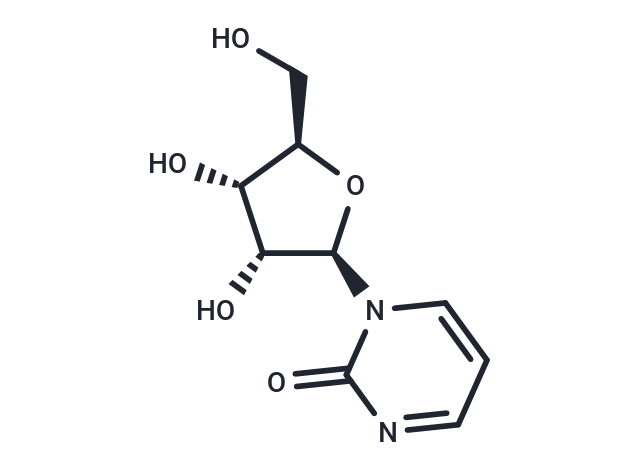Shopping Cart
- Remove All
 Your shopping cart is currently empty
Your shopping cart is currently empty

Zebularine (4-Deoxyuridine) is a DNA methylation inhibitor. Acts as a transition state analog inhibitor of cytidine deaminase by binding to the active size as covalent hydrates. It also inhibits cytidine deaminase (Ki: 2 μM, in a cell-free assay).

| Pack Size | Price | Availability | Quantity |
|---|---|---|---|
| 5 mg | $38 | In Stock | |
| 10 mg | $58 | In Stock | |
| 25 mg | $127 | In Stock | |
| 50 mg | $229 | In Stock | |
| 100 mg | $297 | In Stock | |
| 1 mL x 10 mM (in DMSO) | $43 | In Stock |
| Description | Zebularine (4-Deoxyuridine) is a DNA methylation inhibitor. Acts as a transition state analog inhibitor of cytidine deaminase by binding to the active size as covalent hydrates. It also inhibits cytidine deaminase (Ki: 2 μM, in a cell-free assay). |
| Targets&IC50 | Cytidine deaminase:2 μM(Ki) |
| In vitro | Zebularine forms a tight covalent complex with bacterial methyltransferases. In N. crassa, Zebularine inhibited DNA methylation and reactivated genes silenced by methylation. In T24 bladder cancer cells, Zebularine reactivated the silenced p16 gene and demethylated its promoter region.Zebularine was only slightly cytotoxic to T24 cells. Zebularine was preferentially incorporated into the DNA of cancer cell lines and inhibited cell growth and gene expression to a greater extent than in normal fibroblasts. In addition, Zebularine preferentially inhibited DNA methyltransferase 1 and induced the expression of cancer-associated antigenic genes in cancer cells compared to normal fibroblasts. |
| In vivo | Zebularine forms a tight covalent complex with bacterial methyltransferases. In N. crassa, Zebularine inhibited DNA methylation and reactivated genes silenced by methylation. In T24 bladder cancer cells, Zebularine reactivated the silenced p16 gene and demethylated its promoter region.Zebularine was only slightly cytotoxic to T24 cells. Zebularine was preferentially incorporated into the DNA of cancer cell lines and inhibited cell growth and gene expression to a greater extent than in normal fibroblasts. In addition, Zebularine preferentially inhibited DNA methyltransferase 1 and induced the expression of cancer-associated antigenic genes in cancer cells compared to normal fibroblasts. |
| Cell Research | For methylation analysis, 10T1/2 cells and T24 cells are treated with the various concentrations of zebularine. For 10T1/2 cells, the medium is changed 24 hours after the initial drug treatment, whereas for T24 cells, the medium is changed 24 hours or 48 hours after the initial drug treatment. DNA and RNA are harvested from 10T1/2 cells 72 hours after initial drug treatment and from T24 cells 96 hours after initial drug treatment. The methylation status of the indicated DNA regions is measured in two separate and independent experiments, both of which are done in duplicate[2]. |
| Alias | NSC309132, 4-Deoxyuridine |
| Molecular Weight | 228.2 |
| Formula | C9H12N2O5 |
| Cas No. | 3690-10-6 |
| Smiles | OC[C@H]1O[C@H]([C@H](O)[C@@H]1O)n1cccnc1=O |
| Relative Density. | 1.73 g/cm3 (Predicted) |
| Storage | Powder: -20°C for 3 years | In solvent: -80°C for 1 year | Shipping with blue ice. | ||||||||||||||||||||||||||||||||||||||||
| Solubility Information | DMSO: 60 mg/mL (262.93 mM), Sonication is recommended. H2O: 22.8 mg/mL (99.91 mM), Sonication is recommended. | ||||||||||||||||||||||||||||||||||||||||
Solution Preparation Table | |||||||||||||||||||||||||||||||||||||||||
H2O/DMSO
DMSO
| |||||||||||||||||||||||||||||||||||||||||

Copyright © 2015-2025 TargetMol Chemicals Inc. All Rights Reserved.